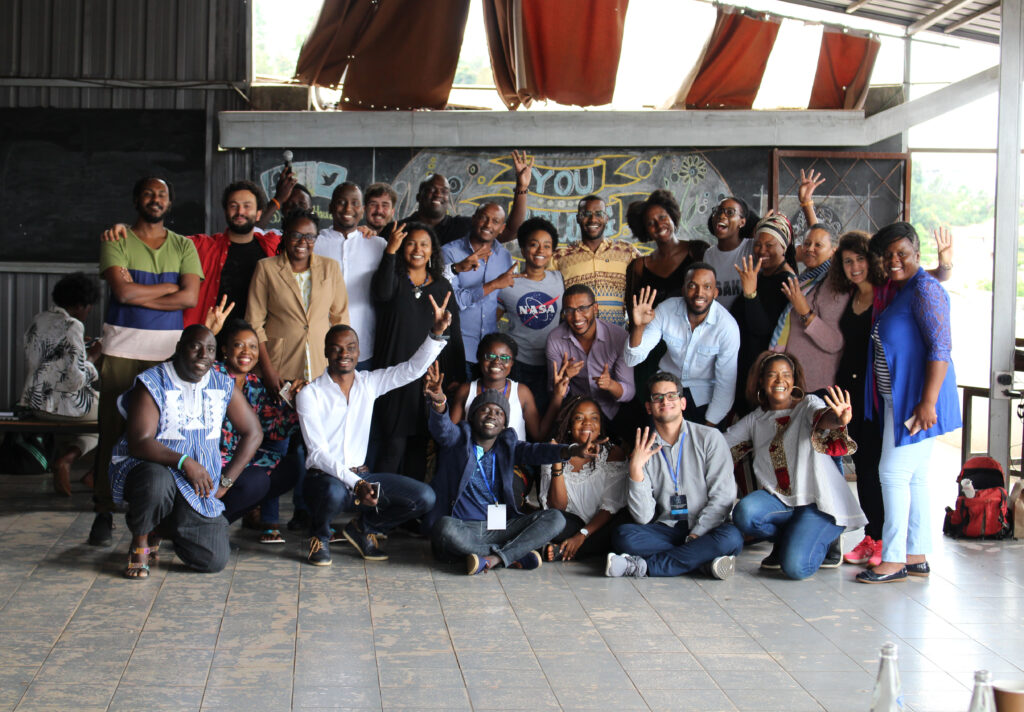Sub-Saharan Africa consists of 46 of the 54 African countries. It is a very diverse place with great cultural and technological disparities. The reason why it is possible to speak about it collectively at all is because of the momentum created by international partnerships that are bringing national governments and public stakeholders together with its citizens, especially the large slice of tech savvy population 25 years old or younger – representing an expected 15 to 20 million new entries in the workforce every year for the next three decades.
Many Sub-Saharan countries suffer from a lack of infrastructure, low internet penetration, and a shortage in venture capital – conditions that do not facilitate business development. On the other hand, they have seen the highest growth in Internet access since 2009, and predictions show that technology-related products and services will reach figures between US$ 148bn and US$ 318bn by 2025. The GSM Association reported that the ‘mobile economy’ alone accounted for 6.7% of the overall GDP in Africa in 2016, representing US$ 153 billion.
Community is key
African culture is heavily rooted in community life, so community is where change happens.
“Community hubs are essentially the heart and soul of where innovation takes place,” said Gloria Muhoro of the African Development Bank after the 2018 African Innovation Hub Convention in Kigali, Rwanda. The output of this event was the first Africa Innovation Policy Manifesto. The manifesto has influenced important continental policy documents, such as the EU-AU Digital Economy Task Force report on a new Africa-Europe Partnership, and the draft African Union Digital Transformation Strategy 2020-2030.
“The legal framework is the first catalyzer,” says Eva Sow Ebion of the Innovation for Policy Foundation, i4Policy, based in Dakar, Senegal. Sow Ebion is heavily involved in the iterative process of implementing and evaluating new digital development policies.

Press Africa Innovation Policy Task Force Meeting, Kigali May 11-13 2018. Credit: Jaiksana Jackson Jumbo
Facilitating access to finance and business support services, adapting tax regimes, and improving administration are key steps to creating and enabling an environment for startup entrepreneurship. This requires the support of national governments as well as organizations like African Union and Smart Africa Alliance at the continental level.
Africa for Africans
“For far too long, we have waited for someone or something to come to the rescue,” says Nderru Waigwa, alumna of the The Young African Leaders Initiative (YALI) and co-founder of Niftyworks plus based in Nairobi, Kenya. For decades, awareness campaigns have portrayed Africa as a place of poverty and hunger, guilting the privileged first world into donating money or goods. Fundraising campaigns have done tremendously important work, of course, but the African identity kept being flattened to those images, reduced to a single narrative that did not reflect the richness, beauty, and potential of the continent.
On the one hand, this created a distorted view of Africa in the world’s eyes, which is still in the process of being dismantled. Many still resist – mostly through no fault of their own – the idea that millions of increasingly well-educated young people (man and women) will lead technological excellence and innovation, with new ideas and models that not only compete with or surpass those on other continents, but will do so in a more sustainable and human-centric fashion, thanks to enlightened policy work like the Africa Innovation Policy Manifesto.
On the other hand, African people absorbed the same narratives that were intended for the rest of the world and, unfortunately, re-shaped their identity accordingly. They believed in their disempowerment, in being helplessly behind, eternally catching up on the leading economies – both economically and culturally.
But this is about to change, thanks to a momentum created by a tight startup community, and by international policy organizations who speak with a unified voice to African national governments and international stakeholders. “Now Africans start believing in themselves and that they have something to offer the world,” says Waigwa.
Brencil Kaimba, cybersecurity expert at Serianu Limited, also based in Nairobi, echoes Waigwa’s words: “African people need to believe in their own capacity for innovation, while continuing to participate in international partnerships.” It is not a question of becoming independent and cutting collaborations. It is a question of ensuring that big corporations from overseas bring development to Africa and not exploitation.
“I am happy that Facebook and Google invest in Africa, provided that we require digital training to equip our citizens against the dangers that accompany the applications,” like privacy and data protection, warns Eva Sow Ebion.
COVID as positive change catalyst
In March 2020, Senegal entered a hard lockdown, like many other African countries and countries across the world. Limiting people’s circulation to prevent the spread of COVID-19 caused a problem of food supply and delivery. Senegal is a 98% Muslim country, and the lockdown was enforced in the middle of Ramadan celebrations, when the demand for bread is particularly high.
It could be expected that policy work to promote the digital agenda would be left aside while more urgent issues are being attended to, but it goes to the credit of the Senegalese government that they understood that the challenges of the health emergency could actually be solved best with digital services.
Quickly, the government launched a national e-commerce platform supporting food delivery, education, and entertainment. In particular, the mobile-based bread delivery service covering the capital city of Dakar, named Jaayma Mburu (‘sell me your bread’), connected bakeries, last mile delivery services, and citizens. This service accelerated the development of many local startups, some of which hired new staff to meet the new client base.
With its prompt and efficient response, the Senegalese government sets an example for many countries even in the world’s leading economies. Governments across Africa are working hard to support digital and economic transformation, and the message for foreign investors is clear: tech and innovation in Africa is steadily taking the center stage in social, political, and economic matters. And this is a great time to merge synergies for mutual advancement.



